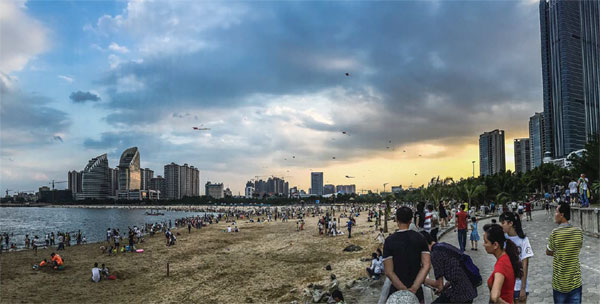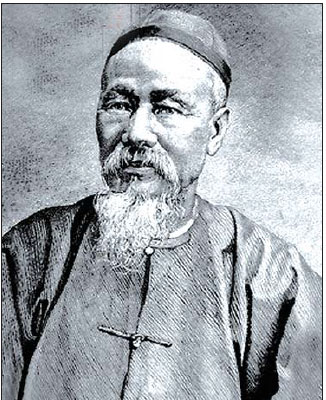Home> Top News
Spirit of China's first US ambassador lives on
By Zheng Caixiong(China Daily) Updated: 2015-09-22
Diplomat's efforts remembered as efforts are boosted to strengthen ties
Zhanjiang, a port city in the west of Guangdong province, expects its economic ties with the United States to further advance following President Xi Jinping's State visit to the country, which starts on Tuesday.
The city's authorities said Zhanjiang, one of the major starting points of the ancient maritime Silk Road, would open wider to the world in years to come.
The city's government and businesses have been urged to grasp the golden opportunity of Xi's visit to expand their cooperation with the US, authorities said.
Located in the Leizhou Peninsula at the southern tip of the Chinese mainland, Zhanjiang is now a major production base of home appliances and a major aquatic breeding center in Guangdong province.
When locals talk about opening-up and economic co-operation with foreign countries, including the US, they often mention a Zhanjiang man who blazed a trail for Sino-US diplomatic relations about one and a half centuries ago.
China's first ambassador to the US, Chen Lanbin (1816-1895) urged the Qing Dynasty (1644-1911) government to open its doors to foreign businesses and expand international cooperation for economic development when he took up his post in the later years of the dynasty.
Chen is still in the hearts and minds of many people in Zhanjiang, which is now seeking foreign financial support and economic cooperation for its own development.
Chen dedicated a lot of energy to promoting Sino-US exchanges in the political, economic and cultural sectors and protecting the legal rights and interests of the large number of overseas Chinese in the US at the time.
Diplomatic principle
Chen's diplomatic principle of "taking the overall situation into account" is still used as reference to help develop current Sino-foreign diplomatic relations.
Chen was born in Huangpo village in Wuchuan, which is under the administration of Zhanjiang.
He urged the Qing government to open its doors to the outside world to learn from foreign advanced sciences and technologies to help develop the country's economy and expand foreign trade.
Chen pushed for a merchants department to be established to help improve the management of the growing number of foreign vessels and representatives who arrived in China.
His proposal was praised and supported by the emperor and many senior officials of the Qing Dynasty.
In 1870, the Tongzhi Emperor accepted a proposal by Chen to send Chinese students to the US to study western military, politics, manufacturing, shipbuilding, science and technologies.
Chen became the first Qing Dynasty official to lead the students to study in the US.
Due to his good performance in diplomatic relations, Chen was also appointed as the ambassador to Spain and Peru by the Qing government.
When Chen returned home to China, he was praised by Empress Dowager Cixi and senior official Li Hongzhang and became a senior official in the Qing government. He pledged to further raise the country's strength to fight against foreign invaders.
Special attention
Born in a poor village family, Chen paid special attention to local people's livelihood throughout his time in power.
He also proposed ideas to harness the strengths of the Yellow River after he visited the area and local households. Chen found floods along the river caused huge damage to the residents' lives every year, with many killed and others crippled by economic losses.
When Chen retired at the age of 68, he returned to Zhanjiang and became a teacher. He died at home at the age of 79.
Chen's former residence is currently a tourist destination in Wuchuan and has been listed as a Guangdong provincial-level historical relic.
The 470-square-meter courtyard dwelling attracts a large number of tourists from home and abroad.
Many overseas Chinese from the US, Canada and South America pay special visits to Chen's former home to cherish the memory of the ancient Chinese diplomat when they return to the mainland.
Chen Yannian, Chen's great grandson, said Chen used to be indifferent to fame and profit and was more concerned about his country and people.
"After he retired and returned to his hometown, he still proposed many valuable proposals to help the local government improve administrative efficiency, harness rivers, construct coastal and river dikes and improve local residents' livelihoods," said Chen Yannian.
"Chen was still invited to give lectures in many places in Zhanjiang and wrote several books on local economic development and people's livelihood in his old age," he added.
The Wuchuan government has invested a large sum of money to reconstruct Chen's residence to help cherish the memory of the famous Chinese diplomat who was regarded as a hero by many locals in Chen's village.
zhengcaixiong@chinadaily.com.cn
|
The coastal city of Zhanjiang is aiming to become a hub for the proposed 21st Century Maritime Silk Road and boost its economic exchanges with the world. Zhang Xiao / China Daily |
|
During the Qing Dynasty (1644-1911), Chen Lanbin, a Zhanjiang native, became China's first ambassador to the United States. Provided to China Daily |


